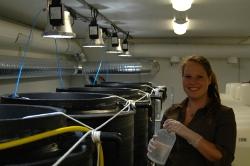Swedish University of Agricultural Sciences
Dr. Stefan Bertilsson’s Network
DR. STEFAN BERTILSSON, DEPARTMENT OF ECOLOGY AND GENETICS, Swedish University of Agricultural Sciences
Stefan Bertilsson is a Professor of Biology at Uppsala University and the Director for the Swedish Infrastructure for Ecosystem science (SITES) and the SciLifeLab Microbial Single Cell Genomics Platform. He is also the coordinator for the SciLifeLab RCP "Aquatic Microbiome Research Initiative". After an undergraduate in Biology at Linköping University, Uppsala University and the Netherlands Institute of Ecology (NIOO), he completed his PhD in Water and Environmental Studies at Linköping University in 1999. After postdoctoral research at Massachusetts Institute of Technology (MIT), he moved to Uppsala University in 2002, first as a KAW researcher, then as a Rådsforskare (VR Researcher), Associate Professor and Professor (since 2011).
From AMRI, Stefan will lead the “Microorganisms as Ecosystem Engineers” theme and will also be heavily engaged in the functional diversity and microbial interactions working group.
At Uppsala, Stefan’s research group works on (1) Microbial carbon processing in lakes. (2) Mercury transformations, (3) Nitrogen cycling and (4) microbial interaction networks. Special projects on Polar Ocean microbiology.
Keywords: Aquatic Microbial ecology, Biogeochemistry, Polar Microbiology, Single Cell Methods, Environmental Genomics
Theme leader for: Microorganisms as Ecosystem Engineers (also heavily engaged in the functional diversity and microbial interactions working group)
Dr. Sarahi Garcia, Post-Doc at Department of Ecology and Genetics, Limnology
My research interests include abundant and uncultivated microorganisms, many of which are free-living, small cells with small genomes. When they feature a free-living lifestyle, interactions with other organisms via exchange of vitamins and other public goods might be a fundamental requirement for their existence. I study cultures and microbial community assemblages to shed light on these microbial interactions.
Dr. Mortiz Buck, Researcher at Department of Ecology and Genetics, Limnology
Keywords: Evolution, Microbiology, Bioinformatics, Environmental Microbiology, Microbial Ecology, Microbial Diversity, Genetic Algorithm, Metagenomics, Molecular Microbial Ecology, Microbial Evolution
Dr. Haiyan Hu, Researcher at Department of Ecology and Genetics, Limnology
My research interest is the interactions between pollutants and microorganisms. I currently focus on the mercury transformations by microorganisms in wetland, with special interest on mercury methylation in boreal peatlands and rice paddy soil.
Dr. Javier Segura, Post-Doc
My research makes use of advanced analytical and molecular techniques (13C NMR, Pyrolysis GC–MS, 16S rRNA) to investigate the environmental controls of microbial metabolic activity and carbon dynamics in high latitude ecosystems. During my postdoctoral work, I´ll be working with experiments aimed at describing the fate of key carbon monomers and other labile biomolecules in freshwater lakes. Using a combination of stable isotopes, 13C NMR and carbon transformation pathways observed in transcriptomes and genomes of the heterotrophs will allow us to establish the link between the added carbon and specific end products. This project will lead to a better understanding of reactivity and origin of the DOM and the roll that microorganisms play in the global C cycle.
Key words: DOM, 13C NMR, microbial metabolism, transcriptome, genome
Dr. Anders Torstensson, Researcher at Department of Ecology and Genetics, Limnology
My research focuses on Arctic sea-ice microbiology. Sea ice is a unique microbial habitat with high spatial and temporal variation in salinity, temperature and nutrient concentrations. I am currently interested in the effects of anthropogenic changes (e.g. ocean acidification and global warming) on marine microalgae and bacteria. I mainly work experimentally with microbial communities and use culture systems to understand how the activity and diversity of Arctic microorganisms may change in the future.
Keywords: Environment, Ecology, Climate Change, Marine Biology, Climate Variability, Biogeochemistry, Ecosystems, Climate Science, Algae, Phytoplankton, Cyanobacteria, Glaciology, Diatoms, Sea Ice
Dr. MaliHeh Mehrshad, Post-Doc
Keywords: Microbiology, Bioinformatics, Applied Microbiology, Environmental Microbiology, Molecular Microbiology, Microbial Ecology, Lipids, Microbial Diversity, Metagenomics, Phospholipids
Leyden Fernandez-vidal, PhD Student
My research interests are focus on the biochemical and ecological aspects of nitrogen fixation by non-cyanobacterial community members in freshwater lakes. I am also studying functional genes and metabolic pathways underlying this process through both experimental and bioinformatics approaches.
Rhiannon Mondav, PhD Student
I am a microbial ecologist who works in terrestrial and freshwater ecosystems. I investigate microbial evolution and community interaction with anthropogenic and natural changes in the environment. I use and develop molecular, genetic, and computational tools to assist my investigations. On enjoyable, but unfortunately rare, occasions you might catch me out in the field collecting samples.
Keywords: genomics microbial ecology carbon cycle aquatic ecosystem ecology computational systems biology










